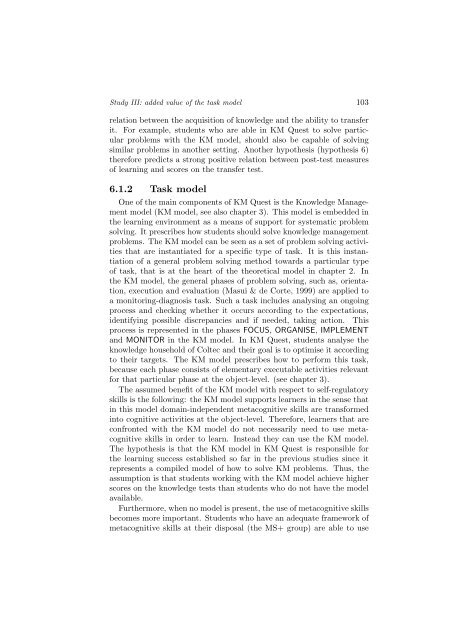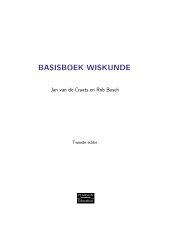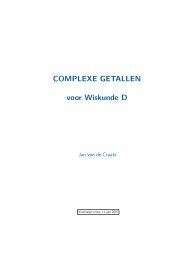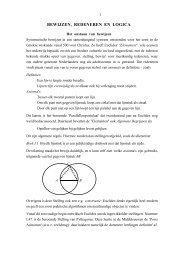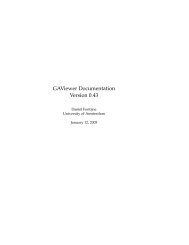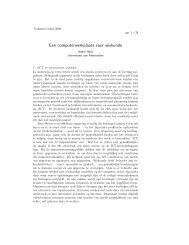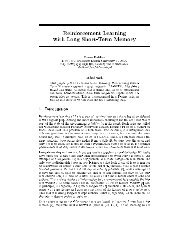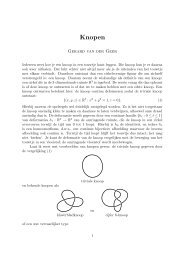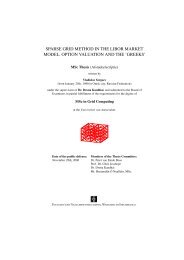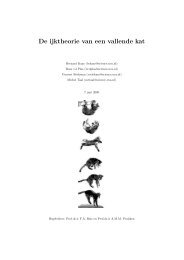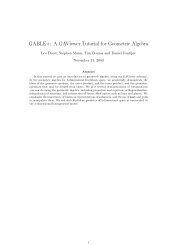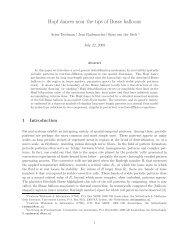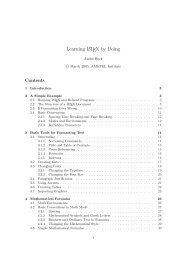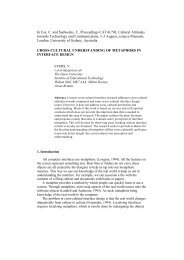The role of metacognitive skills in learning to solve problems
The role of metacognitive skills in learning to solve problems
The role of metacognitive skills in learning to solve problems
You also want an ePaper? Increase the reach of your titles
YUMPU automatically turns print PDFs into web optimized ePapers that Google loves.
Study III: added value <strong>of</strong> the task model 103<br />
relation between the acquisition <strong>of</strong> knowledge and the ability <strong>to</strong> transfer<br />
it. For example, students who are able <strong>in</strong> KM Quest <strong>to</strong> <strong>solve</strong> particular<br />
<strong>problems</strong> with the KM model, should also be capable <strong>of</strong> solv<strong>in</strong>g<br />
similar <strong>problems</strong> <strong>in</strong> another sett<strong>in</strong>g. Another hypothesis (hypothesis 6)<br />
therefore predicts a strong positive relation between post-test measures<br />
<strong>of</strong> learn<strong>in</strong>g and scores on the transfer test.<br />
6.1.2 Task model<br />
One <strong>of</strong> the ma<strong>in</strong> components <strong>of</strong> KM Quest is the Knowledge Management<br />
model (KM model, see also chapter 3). This model is embedded <strong>in</strong><br />
the learn<strong>in</strong>g environment as a means <strong>of</strong> support for systematic problem<br />
solv<strong>in</strong>g. It prescribes how students should <strong>solve</strong> knowledge management<br />
<strong>problems</strong>. <strong>The</strong> KM model can be seen as a set <strong>of</strong> problem solv<strong>in</strong>g activities<br />
that are <strong>in</strong>stantiated for a specific type <strong>of</strong> task. It is this <strong>in</strong>stantiation<br />
<strong>of</strong> a general problem solv<strong>in</strong>g method <strong>to</strong>wards a particular type<br />
<strong>of</strong> task, that is at the heart <strong>of</strong> the theoretical model <strong>in</strong> chapter 2. In<br />
the KM model, the general phases <strong>of</strong> problem solv<strong>in</strong>g, such as, orientation,<br />
execution and evaluation (Masui & de Corte, 1999) are applied <strong>to</strong><br />
a moni<strong>to</strong>r<strong>in</strong>g-diagnosis task. Such a task <strong>in</strong>cludes analys<strong>in</strong>g an ongo<strong>in</strong>g<br />
process and check<strong>in</strong>g whether it occurs accord<strong>in</strong>g <strong>to</strong> the expectations,<br />
identify<strong>in</strong>g possible discrepancies and if needed, tak<strong>in</strong>g action. This<br />
process is represented <strong>in</strong> the phases FOCUS, ORGANISE, IMPLEMENT<br />
and MONITOR <strong>in</strong> the KM model. In KM Quest, students analyse the<br />
knowledge household <strong>of</strong> Coltec and their goal is <strong>to</strong> optimise it accord<strong>in</strong>g<br />
<strong>to</strong> their targets. <strong>The</strong> KM model prescribes how <strong>to</strong> perform this task,<br />
because each phase consists <strong>of</strong> elementary executable activities relevant<br />
for that particular phase at the object-level. (see chapter 3).<br />
<strong>The</strong> assumed benefit <strong>of</strong> the KM model with respect <strong>to</strong> self-regula<strong>to</strong>ry<br />
<strong>skills</strong> is the follow<strong>in</strong>g: the KM model supports learners <strong>in</strong> the sense that<br />
<strong>in</strong> this model doma<strong>in</strong>-<strong>in</strong>dependent <strong>metacognitive</strong> <strong>skills</strong> are transformed<br />
<strong>in</strong><strong>to</strong> cognitive activities at the object-level. <strong>The</strong>refore, learners that are<br />
confronted with the KM model do not necessarily need <strong>to</strong> use <strong>metacognitive</strong><br />
<strong>skills</strong> <strong>in</strong> order <strong>to</strong> learn. Instead they can use the KM model.<br />
<strong>The</strong> hypothesis is that the KM model <strong>in</strong> KM Quest is responsible for<br />
the learn<strong>in</strong>g success established so far <strong>in</strong> the previous studies s<strong>in</strong>ce it<br />
represents a compiled model <strong>of</strong> how <strong>to</strong> <strong>solve</strong> KM <strong>problems</strong>. Thus, the<br />
assumption is that students work<strong>in</strong>g with the KM model achieve higher<br />
scores on the knowledge tests than students who do not have the model<br />
available.<br />
Furthermore, when no model is present, the use <strong>of</strong> <strong>metacognitive</strong> <strong>skills</strong><br />
becomes more important. Students who have an adequate framework <strong>of</strong><br />
<strong>metacognitive</strong> <strong>skills</strong> at their disposal (the MS+ group) are able <strong>to</strong> use


